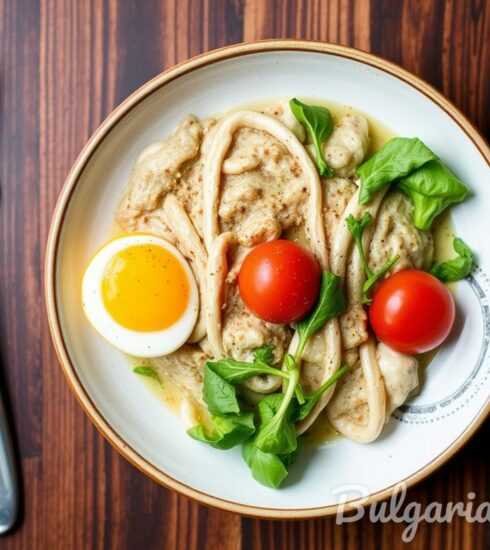Explore Authentic Flavors: Dive into a Bulgarian Culinary Tour of Heartland Traditions
Welcome to a gastronomical journey through Bulgaria’s heartland, an area rich with traditions and community life that expresses itself wonderfully through its cuisine. In this article, titled “Feasting with the Locals: Intimate Eats and Stories from Bulgaria’s Heartland,” we will explore the culinary treasures found deep within the Bulgarian countryside, discovering how food weaves into the fabric of everyday life and highlights the region’s culture.
The content provided will be more than a simple tour of local dishes; it also serves as an intimate glimpse into the lives of the local people who prepare them. From age-old recipes passed down through generations to contemporary reinventions that tantalize the palette, Bulgarian heartland cooking offers a symphony of flavors waiting to be explored.
The Essence of Bulgarian Cuisine
Bulgarian cuisine is a representative of the Southeastern European gastronomical culture, sharing characteristics with Turkish, Greek, and Middle Eastern cuisines yet having its own distinctive qualities formed by the country’s unique geography, history, and climate. The fundamental traits of the food here include the use of fresh, locally sourced ingredients, a significant emphasis on spices, and an array of dairy products, especially yogurt and cheese. Let’s delve deeper into some of these quintessentially Bulgarian elements:
Fresh and Local Ingredients

The heartland of Bulgaria boasts a fertile landscape that supports the lush growth of a variety of fruits and vegetables. These ingredients form the backbone of Bulgarian culinary traditions, ensuring that dishes burst with natural flavors. Staple vegetables include tomatoes, peppers, onions, cucumbers, and beans, while the fruit assortment is led by grapes, apples, and plums.
Yogurt – A National Pride
Bulgarian yogurt, known locally as ‘kiselo mlyako’, is famed worldwide for its unique taste, texture, and health benefits. This product, rich in probiotics, is an essential ingredient in many Bulgarian dishes and is cherished in daily consumption. The village of Momchilovtsi is particularly noted for its yogurt, with its recipe considered an age-old secret among locals.
Spices and Seasonings
Herbs and spices play an essential role in adding depth to the flavors of Bulgarian dishes. Paprika, dill, garlic, and mint are commonly used, along with a special blend known as ‘chubritsa’, a sort of local savory which adds an unmistakable flavor to traditional dishes.

Traditional Dishes to Savor
The culinary offerings in Bulgaria’s heartland are profoundly influenced by the historical and socio-economic matrix of the region. With a rich pastoral tradition, many Bulgarian dishes are centered around dairy products and meats, particularly lamb and pork. Here are a few traditional Bulgarian dishes you cannot miss:
- Banitsa: This beloved pastry is a mixture of eggs, yogurt, chunks of Bulgarian white cheese, and butter between filo pastry layers, baked to golden perfection, commonly enjoyed as a breakfast dish or during major celebrations.
- Kavarma: A personal favorite among locals, this dish is a slow-cooked stew of meat and vegetables, seasoned generously and cooked in a traditional earthenware pot to enhance its flavors.
- Shopska Salata: A refreshing salad made from tomatoes, cucumbers, onion, and topped generously with sirene cheese, representing the colors of the Bulgarian flag.
These dishes not only offer a treat to the tastebuds but also reflect the history and the spirit of the Bulgarian community. An insight into their production and the stories behind these traditional meals provides a deeper connection to the cultural fabric of the area.

Cultural Significance of Meals
In Bulgaria’s heartland, food is never just about consumption. Meals are a focal point for community gathering, celebrating, and maintaining the rich tapestry of cultural and family traditions. Preparing and consuming food is a communal affair, often accompanied by stories, songs, and dances. Let’s explore this further:
Role of Festivals and Gatherings
Bulgarian festivals often revolve around the celebration of seasonal harvests, religious customs, or historical events, many of which have specific dishes associated with them. For example, during the Kukeri Festival, locals prepare and enjoy traditional bean soups meant to bring health and good fortune.
Everyday Dining Traditions

Even routine meals are approached with a sense of respect for tradition and family values. Dinners are a time for families to gather and share not only food but also the events of the day, continuing a practice that strengthens bonds and enriches the family dynamic.
Discover More Culinary Insight
If you’re fascinated by the richness of Bulgarian culinary traditions and wish to explore more about what the country has to offer, consider reading further into specific regional specialties in:
The treasure trove of Bulgarian cuisine is immense, with each region offering unique dishes reflecting their local heritage, ingredients, and culinary techniques. While Bulgaria’s heartland holds an array of traditional and delicious offerings, the entire country is a culinary adventure waiting to be discovered.






